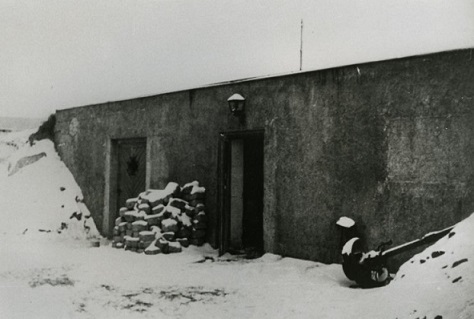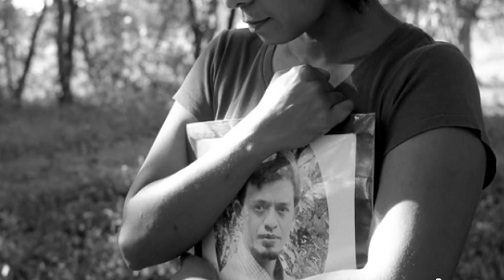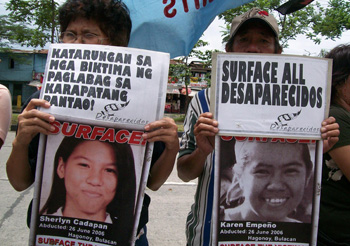* Inilathala ng Free Legal Assistance Group (FLAG) at isinalin sa Filipino ng Philippine Center for Investigative Journalism (PCIJ)

ANUMAN ANG SITWASYON, NANANATILING LUBOS AT HINDI DAPAT YURAKAN ANG ATING MGA BATAYANG KARAPATAN. KABILANG DITO ANG MGA SUMUSUNOD:
(In any situation, you do not lose your basic rights, such as….)
• Karapatang mabuhay (The right to life);
• Karapatang hindi ma-torture o isailalim sa malupit, di-makatao, at kahiya-hiyang pakitungo o parusa (The right not to be trotured nor subjected to cruel, inhuman or degrading treatment or punishment);
• Karapatang hindi sapilitang pagtrabahuhin (The right not to be subjected to forced labor)
• Karapatang hindi makulong dahil sa hindi pagbayad ng utang (The right not to be imprisoned for non-payment of debt);
• Karapatang huwag maparusahan para sa mga gawaing hindi pa naisabatas na krimen nang ito ay mangyari (The right not to be punished for an act which was not yet a crime at the time of its commission);
• Karapatan na kilalanin at tratuhin bilang tao (The right to be recognized and treated as a person); and
• Karapatan sa malayang pag-iisip, konsiyensiya, at pananampalataya or relihiyon (The right to freedom of thought, conscience, and religion).

Lubos o absolute ang lahat ng karapatang ito. Sa anumang kondisyon o pangyayari, hindi maaring pigilan o suspendihin ang pag-ako natin ng mga karapatang ito. Ito ay totoo kahit sa ilalim ng martial law o state of public emergency na naideklara ng pamahalaan. Ang mga karapatang ito ay “non-derogable” sa ilalim ng United Nations International Covenant on Civil and Political Rights na sakop ang pamahalaan ng Pilipinas bilang signatory.
(These rights ate absolute. Under no condition can their fulfillment or enjoyment be suspended. This is true even when martial law or any other state of emergency has been declared. These are non-derogable rights under the International Covenant on Civil and Political Rights to which the Philippines is a signatory.)
May iba pang mga karapatan na itinuturing na inalienable o inviolable o hindi maikakait at hindi dapat labagin kailanman kabilang na ang:
(There are other rights that are considered inalienable and inviolable, such as…)
* Karapatan na hindi halughugin ang iyong tahanan kung walang search warrant na pirmado ng isang hukom o judge, at karapatang huwag samsamin ang anumang gamit sa iyong bahay na hindi nakadetalye sa search warrant. Gayunman, kung ikaw ay nahuli ng ligal, ikaw at ang iyong immediate surroundings o kinalalagyan ay maaring ma-search para sa dangerous weapons o iba pang ebidensiya, at anuman ang makita sa iyong sarili at immediate vicinity ay maaring kunin ng mga otoridad kung ito ay ginamit diumano sa krimen na dahilan ng iyong pagkahuli.
(The right not to have your house searched without a search warrant issued by a judge, and not to have anything seized which is not specified in the search warrant. However, if you are legally arrested, your person and immediate surroundings may be searched for dangerous weapons, and any evidence found on your person or immediate vicinity (only on your person and immediate vicinity) which may have been used to commit the crime for which you are being arrested may be seized.)
* Karapatan na maging malaya at walang pangamba sa iyong personal na seguridad. Maari kang pagkaitan ng kalayaan ayon lamang sa mga batayan at proseso na nakatala sa Konstitusyon at batas.
(The right to liberty and security of person. You can be deprived of liberty only on grounds and procedures established by the Constitution and existing law.)

* Karapatan na hindi arestuhin kung walang ebidensiya na may krimen nang naganap at diumano’y kalahok ka sa gawaing ito. Maari ka lamang arestuhin sa bisa ng isang arrest warrant na pirmado ng isang hukom o judge, liban na lang kung:
(The right not to be arrested except on evidence that a crime gas been committed and that you probably committed it. You may be arrested only on the strength of a warrant of arrest issued by a judge, except:)
* Kung ikaw ay may ginawa o ginagawang krimen, o nagbabalak gumawa ng kasalanan (offense) sa batas, sa harap ng isang arresting officer;
(When you have committed, are actually committing, or are attempting to commit an offense in the presence of the arresting officer);
* Kung, batay sa personal na kaalaman ng arresting officer sa mga pangyayari at datos ng kasalanang naganap, naniniwala siyang ikaw ang maysala;
(When an offense has been committed and the arresting office has probable cause to believe, based on personal knowledge of the facts and circumstance, that you committed the offense);
* Kung ikaw ay tumakas mula sa kulungan o piitan, o habang inililipat ng kulungan;
(When you have escaped from prison or detention or while being transferred from one confinement to another.)
Isang sibilyan na prosecutor ang dapat magsuri sa isang inquest proceeding kung ligal o iligal ang iyong pagka-aresto. Sa inquest proceeding na ito, maaring magdesisyon ang prosecutor na:
(The legality of your arrest must be determined in an inquest proceeding conducted by a civilian prosecutor. The prosecutor, in a summary proceeding, can):
* Palayain ka (ito ay pwedeng maganap kahit man wala pang kumpletong preliminary investigation na naganap);
(Order your release [this may or may not be subject to a full-blwm preliminary invetsigation]};
* Ipagtibay na ligal ang iyong pagka-aresto at isampa ang kaukulang complaint o impormasyon laban sa iyo sa trial court;
(Affirm the legality of your arrest and prepare the corresponding complaint or information with the trial court};
* Isangguni sa nahuli kung nais niyang magkaroon ng preliminary investigation at pumirma sa isang waiver. Ito ay kadalasang nangyayari. Huwag pumirma sa waiver kung hindi nabigyan ng sapat na impormasyon ng kahihinatnan ng pagpirma nito. Ang pag-pirma mo sa waiver ay nangangahulugang pumapayag kang manatili sa kulungan, habang naghinihintay sa preliminary investigation. Ang pagpirma mo sa waiver ay maari ring ituring na wala kang planong magsampa ng kaso sa mga nanghuli sa iyo.
(Often the inquest prosecutor will ask the person arrested if s/he desires a preliminary investigation, in which case s/he will be asked to sign a waiver. Do not sign the waiver without beng fully informed of the nature and consequences of signing it. Signing the waiver may — and often does — mean that you are going to remain in detention, pending preliminary investigation. It may also mean that you are waiving your right to file cases against those who arrested you.)
Kapag na-aresto at habang nasa kulungan, at ikaw ay tinanong o inimbestiga ng mga pulis o sundalo, nananatiling lubos ang iyong mga karapatang pantao tulad ng:
(While under arrest or detention, if you are questioned or investigated by the police and military, you have the following rights:)
* Malinaw na masabihan at basahan ng iyong mga karapatan sa Konstitusyon, kasama na ang manatling tikom ang bibig;
(To be informed of your right to remain silent and other constitutional rights);
* Magkaroon ng mahusay at walang kinikilingang abogado, at mas maiman pa, personal mong pinili;
(To have competent and independent counsel preferably of your own choice; and)
* Bigyan ng abogado, kung hindi mo kayang kumuha ng sarili mong tagapatanggol;
(To be provided with counsel if you cannot afford one.)

Sa lahat ng pag-uusig ng krimen, ito ang iyong mga karapatan:
(In all criminal prosecutions, you have the following rights:)
* Huwag piliting tumestigo laban sa sarili mo
(Not to be compelled to testify against yourself);* Manatiling tikom ang bibig kapag nahuli at magkaroon ng abogado
(To remain silent and to counsel);* Bigyan ng impormasyon ukol sa uri at dahilan ng akusasyon laban sa iyo
(To be informed of the nature and cause of the accusations against you);* Magkaroon ng mabilis, bukas, at patas na pagilitis
(To have a speedy, public, and impartial trial);* I-apela ang conviction order o desisyon ng korte na ikaw ay maysala
(To appeal any conviction);* Ituring na inosente hangga’t hindi napapagtibay na ikaw ay maysala
(To be presumed innocent until the contrary is proved);* Harapin at madinig ka at iyong abogado sa paglilitis
(To be present and heard by yourself and counsel);* Matulungan ng mga proseso ng korte pati na ang compulsory attendance ng mga testigo o witnesses at sa paglalahad ng ebidensiya laban sa iyo
(To avail yourself of court processes to secure the compulsory attendance of witnesses and the presentation of evidence in your defense);
* Makita nang harapan at ma-cross-examine ang mga testigo laban sa iyo
(To meet the witnesses face-to-face and to cross-examine them);
* Magkaroon ng preliminary investigation ng akusasyon laban sa iyo
(The right to a preliminary investigation;
* Huwag litisin at parusahan ng dalawang beses para sa parehong krimen
(The right against double jeopardy);
* Bago ma-convict, maglagak ng pyansa, liban na lang sa mga kasong may parusang bitay at malakas ang ebidensiya ng pagkakasala
(Before conviction, the right to bail except for capital offenses when evidence of guilt is strong);
* Pakitunguhan sa paraang makatao at may paggalang
(The right to be treated with humanity and with respect for your personal dignity);
* Manirahan at maglakbay nang malaya
(The right to liberty of abode and the right to travel).



